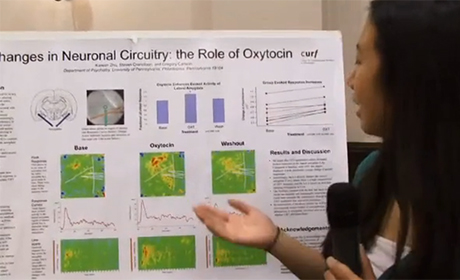Patients with schizophrenia often display both social and cognitive deficits, along with hypersensitivity to otherwise non-harmful stimuli. Pinpointing the exact causes of these symptoms, however, is another matter entirely. But Kaiwen Zhu, C’14, has made it her mission to better understand the intricacies of the disease. “The courses I completed in the Biological Basis of Behavior program first introduced me to the challenges surrounding this disease. The principles and experiments presented showed great potential for meaningful undergraduate research.”
Her advisor, Greg Carlson, an assistant professor in the medical school's psychiatry department who played a large part in developing protocols used to research schizophrenia, guided Zhu through the initial stages of her project. Using a special breed of mice that demonstrate schizophrenic characteristics, she was able to test hypotheses of how schizophrenic-like mice differ from wild-type mice in their response to oxytocin, a neuropeptide hormone which strongly facilitates social bonding. “We found that schizophrenic-like mice were significantly less responsive to oxytocin than their wild-type counterparts,” Zhu says. “Decreased sensitivity to this pro-social hormone could be a contributing explanation for schizophrenic symptoms, as well as indicate future targets for drug development.”
In October, Zhu presented her research at the Society for Neuroscience annual conference in New Orleans. She is currently working on writing a manuscript to be submitted to a journal.
Learn more about her research in the video below:



